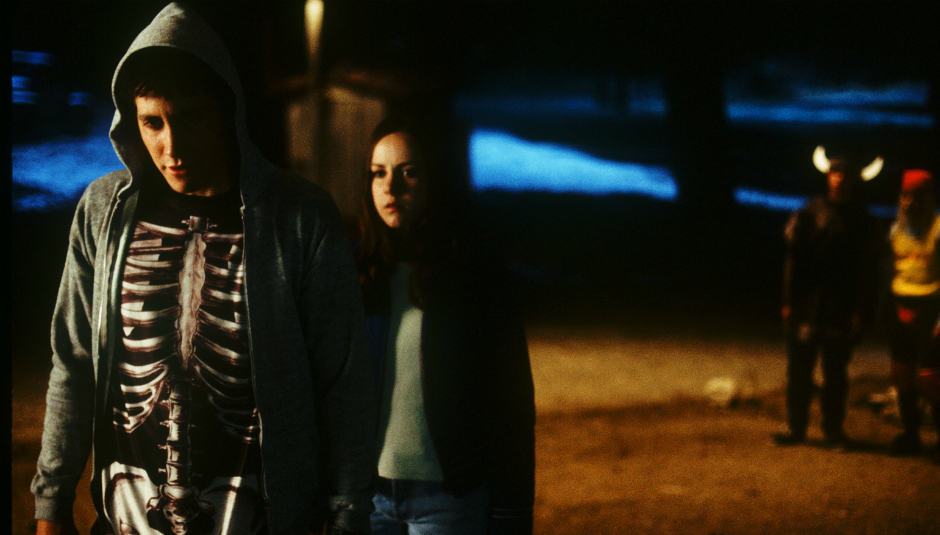Back in 2001, Donnie Darko was the directorial debut of 25 year old Richard Kelly. Writing the film’s script aged just 23, Donnie Darko arrived in American cinemas in October 2001 following a long and difficult selling period after its largely well-received unveiling at the Sundance Film Festival. It took the vision of another director, however, to step in and convince distributors that the film would be a success. That director was a certain Christopher Nolan.
The intervention worked, and the film was distributed via Newmarket and arrived in cinemas across America in the autumn of 2001. The timing, however, couldn’t have been worse. Planned for release in October, barely one month after the 9/11 attacks, audiences were not in the mood to watch a dark, apocalyptic film featuring a plane crash. Grossing just over $500,000 at the US box office, a mere 10% of its original production budget, the film was largely written off.
Yet it was when the film hit UK cinemas that the fortunes of Donnie Darko changed. An overnight cult hit, the film made more than half its money back in just two weeks. A mere 6 weeks after its release in the UK, over 300,000 people had bought tickets to see the film. Thousands of forums and websites appeared, dedicating to solving the mysteries of the film, and a cult following quickly emerged. By the time DVD sales were taken into account, the film had made over $10 million. Not bad for an indie film many had written off entirely.
The film itself explores the notion of time and space – think Hugh Everett’s many worlds theory – though the angst-ridden, teenage eyes of Donnie, a troubled soul prone to sleepwalking and talking to his imaginary friend, a six-foot tall rabbit called Frank, who tells him the world is going to end in twenty-eight days, 6 hours, 42 minutes and 12 seconds.
I meet Richard Kelly at the British Film Institute as there’s a new 4K restoration of Donnie Darko released for its 15th Anniversary. For him, there’s no doubt; the success of the film is down to British cinema goers.
“I feel blessed, I feel very lucky”, he tells me, looking at the floor, shyly, when I ask him how he feels about the film’s success after such difficult beginnings. “I feel honoured that the film community here [in the UK] helped to rescue the film. To bring it back 15 years later and to unveil this new restoration...” he breaks off. It’s like Kelly can’t quite believe it himself.
“Arrow Films called and said we want to do this, do you want to be involved and I was like: ‘Of course!’ It was a big job to go in and restore the original negative but also both cuts of the movie and do some more visual enhancements, particularly in the director's cut that were never finished properly. A lot of work went into it – we knew we had to do it, and we knew we had to do it right. And the fact it was being done and financed out of the UK just felt right because of the history of the film. To come back here and to do the release for Christmas, it just feels great. I'm excited for people. There's probably a lot of people who probably never saw it on the big screen.”
Beginning it’s run at the BFI on December 16th prior to nationwide release on December 23rd, Kelly thinks the film will appeal to a host of new audiences, not least because of the timeless nature of the film’s themes. And coming at the end of the post Brexit, post-Trump horror show that has been 2016, it is, perhaps, more relevant than ever.
“I think the film still holds up, I do. And I think it was always designed for the big screen. There's a lot of detail in the images and the sound design. It is an intense movie and I think there's still probably a lot of younger people who were still in their diapers when the movie came out who can see it for the first time. And even though it takes place in 1988, and it was shot in the year 2000, I think hopefully it can feel timeless – it can feel like an expression that is universal. It’s a story of the American suburbs and for some reason it plays so well in the UK.”
When I ask Kelly about why this is, he thinks the film’s music may have also played a key part.
“I'm convinced it [did so well in the UK] because of the pop music. It's mostly British musicians. Probably about half of the songs were very much by my design and in my script, and then my music supervisors were really helpful to bring in Joy Division and other bands that I wasn't quite familiar with at the time. And then my composer, Michael Anders, brought in his friend Gary Jules and had the idea of covering ‘Mad World’ by Tear for Fears. That was a revelation.”
“And once they started recording that I was like: ‘This is great. This is going right at the end of the movie and that's that.’ It was mind blowing [that it went to number one]. In my mind, that only happens to like songs by Whitney Houston or Mariah Carey or something! We were this little indie film with a completely unknown artist named Gary Jules and then it went wild. You see it on American Idol and you see it in commercials and everywhere. And the idea of doing the slow cover of a big pop song, that was quite a new approach at the time. I’ve got to give a lot of credit to Mike and Gary because they were the musicians and they figured it out.”
The Christmas number 1 of 2003, Jules’ cover of ‘Mad World’ brought the soundtrack of Donnie Darko into the consciousness of many. Featuring artists such as Duran Duran, Echo and the Bunneymen, Joy Division and INXS (later on the Director’s Cut), the soundtrack helped to set the tone for the 1988 period setting of the film. One of the film’s most successful sequences is Donnie’s arrival to high school, backed by ‘Head over Heels’ by Tears for Fears. A lengthy shoot, Kelly didn’t have permission to use the track at the original filming, infuriating the production team.
“I went ahead and did it like the belligerent son of a bitch that I am. I’m known for doing that, for forcing people to take crazy risks. If I know I'm going to take that risk, I know because the song and the images are gonna work - they're gonna work! And then when I show it to the musician they're gonna be like: ‘Ooooh this is good!’ And luckily, they'll license us the song. One of these days that's gonna backfire horribly on me and the musician is going to say: 'Fuck you, you can't have the song!' Usually, for the most part, musicians are really generous collaborative people. Much more so than a lot of other people in the creative business.”
I ask Kelly how much freedom he had as a 25-year-old film director, straight out of film school.
“The script was so wild that there wasn't much they could do to reign it in. It is what it is. There was a rabbit, a jet engine, there's liquid things...people were like: 'Do you really need this? Does it really need to be 1988?’ And I was like…yes, and yes. The further we got into it, the more people started to realise that there was a vision, there was a strategy. There was a lot of scepticism, but you get that with any film.”
The dark originality of Donnie Darko earned Kelly early comparisons to David Lynch and Stephen King, not least for the way in the which the film transcends genres, spaces, and time. I ask Kelly how he feels today, in hindsight, that the film has received critical interpretation from areas as diverse as music, literature, psychology and astrophysics.
“It’s incredibly rewarding and I'm very proud of that fact. When I go to write something like this, I do it because it's stimulating to me. It sounds narcissistic, but you have to please yourself first; as an artist you have got to try to create something that you yourself most want to see. You can't write for other people. You can if you want but first and foremost you’ve got to write for yourself, you’ve got to love yourself…I sound like someone from the movie! Once you're operating from that point of view, you're hopefully on track to telling a great story.”
“I try not to live my life in hindsight...but there's always things people think they could have done better or differently. If anything, I would tell myself to only surround myself with the right people and to try to listen, to not let your emotions dictate everything. As you get older, you become more measured and you learn how to compartmentalise everything. But emotion is incredibly important because I don't know a worthy piece of art that is divorced from emotion, but at the same time, some of the business aspects can be navigated with a calmer state of mind. Then again, I'm not in this for the business, I'm in it for the art, for better or for worse.”
Donnie Darko 15th Anniversary 4K Restoration will screen at the BFI from 17th December and in cinemas nationwide from 23rd December. BFI Tickets are on sale now, and can be purchased here.






















